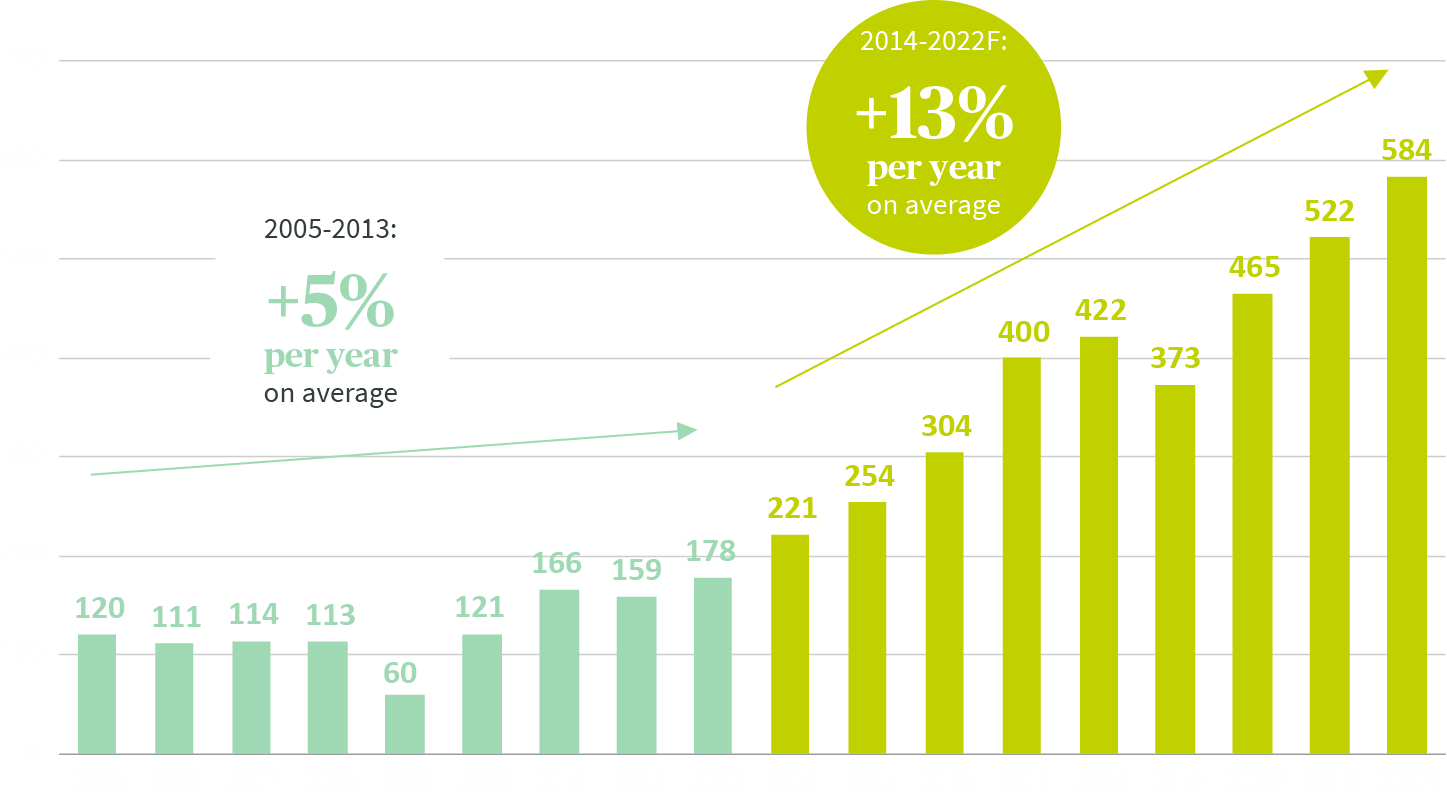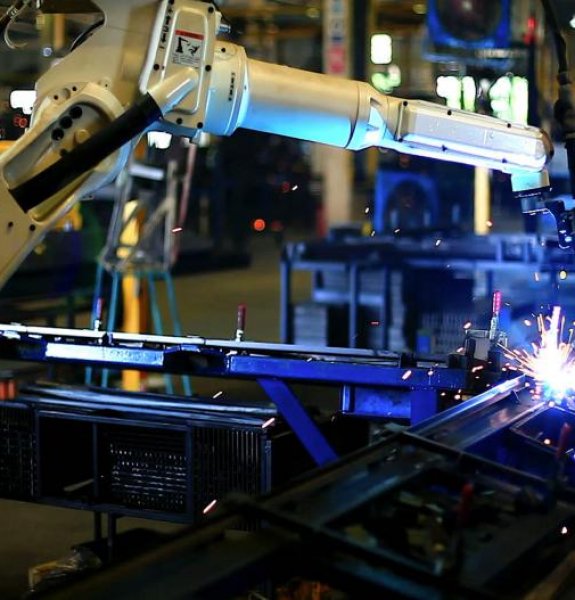What is automation?
Automation is the creation and application of technologies to improve or optimise processes. Automation began life on the factory floor, as automotive companies aimed to improve manufacturing techniques, but has since evolved to influence multiple aspects of how we live and work.
What are the potential benefits of investing in automation?
Automation can help companies:
- Increase efficiency and lower costs
- Improve reliability and consistency
- Perform highly sophisticated and delicate tasks
- Work safely alongside human workers
- Keep pace with customers’ increasingly on-demand preferences
Expected annual growth of the global robotics market until 20251Source: Boston Consulting Group, 2015
While we are still in the early stages of this disruptive trend, its long-term potential seems evident to a growing number of equity investors. With an opportunity set across both larger and smaller companies, robotics is increasingly being recognised as a viable investment and potentially superior growth area of the market.
Our Robotech strategy
Our Robotech strategy seeks to provide investors with access to the long-term superior growth potential of the robotics market, an expanding area of the economy with an increasing number of small and mid-cap investment opportunities. This includes:
- Industrial automation: Technologies helping companies increase precision, reliability and efficiency across industries.
- Transport: Technological advances focused on vehicle safety and the pathway towards autonomous vehicles. Additional opportunities outside of the car industry in areas such as agriculture and mining.
- Healthcare: Companies involved in robotic surgery, assistance and remote healthcare.
- Technology enablers: The intelligence that powers and controls robotics. This provides the sensors, connectivity and intelligence used to gather and analyse information
Why invest in automation now?
The demand for industrial robots has accelerated in recent years due to the ongoing trend towards automation and innovative technological advancements. Advances in technology have made robots capable of performing highly sophisticated and delicate work as well as working alongside humans to drive productivity and efficiency.
We believe this is just the beginning of a multi-decade theme:
Worldwide supply of industrial robots (units in thousands)

Source: AXA IM / IFR World Robotics 2021
Robots are being used across more industries
As robots become smarter, more flexible and increasingly capable of working alongside humans, they are being used across more industries:
- Alongside the automotive market, the semiconductor and electronics industry is the main user of industrial robots.
- The food and beverage industry has been one of the fastest-growing areas in terms of robotic use over the past few years.
- Robotic precision is also useful for repetitive or dangerous jobs, such as hazardous materials testing.
Robots are also becoming more affordable while labour cost is increasing and the working population is shrinking in many countries.
All investment involves risk and capital is not guaranteed. Such investment strategies are invested in financial markets and use techniques and instruments which are subject to some levels of variations, which may result in gains or losses. Additional risks may include Counterparty Risk; Credit Risk; or risks associated with the impact of any techniques such as derivatives or leverage.
Access other evolving economy themes
To help people invest in the companies that are embracing these changes, we have adapted our internal research capabilities to incorporate the five main trends that we believe represent the future for long-term fundamental growth investing.

Ageing and lifestyle
The number of over-60s2US Department of Commerce, latest data available as of March 2018 is expected to triple in size between 2000 and 2050, creating challenges for companies and individuals

Connected consumer
Only 18%3Statista, 3rd Feb 2022 of global retail sales are transacted online, which will likely increase as smartphone adoption rises globally

Clean Economy
Innovative companies are creating solutions to address pressures on scarce natural resources and the need for greenhouse gas emission reduction

Transitioning societies
The growth of the global middle class is at a 150-year high4UN, correct as at March 2018, boosting consumption in Asia and the developing world
Disclaimer
The information on this website is intended for investors domiciled in Switzerland.
AXA Investment Managers Switzerland Ltd (Part of BNP Paribas Group) is not liable for unauthorised use of the website.
This website is for advertising and informational purpose only. The published information and expression of opinions are provided for personal use only. The information, data, figures, opinions, statements, analyses, forecasts, simulations, concepts and other data provided by AXA Investment Managers Switzerland Ltd (Part of BNP Paribas Group) in this document are based on our knowledge and experience at the time of preparation and are subject to change without notice.
AXA Investment Managers Switzerland Ltd (Part of BNP Paribas Group) excludes any warranty (explicit or implicit) for the accuracy, completeness and up-to-dateness of the published information and expressions of opinion. In particular, AXA Investment Managers Switzerland Ltd (Part of BNP Paribas Group) is not obliged to remove information that is no longer up to date or to expressly mark it a such. To the extent that the data contained in this document originates from third parties, AXA Investment Managers Switzerland Ltd (Part of BNP Paribas Group) is not responsible for the accuracy, completeness, up-to-dateness and appropriateness of such data, even if only such data is used that is deemed to be reliable.
The information on the website of AXA Investment Managers Switzerland Ltd (Part of BNP Paribas Group) does not constitute a decision aid for economic, legal, tax or other advisory questions, nor may investment or other decisions be made solely on the basis of this information. Before any investment decision is made, detailed advice should be obtained that is geared to the client's situation.
Past performance or returns are neither a guarantee nor an indicator of the future performance or investment returns. The value and return on an investment is not guaranteed. It can rise and fall and investors may even incur a total loss.
AXA Investment Managers Switzerland Ltd (Part of BNP Paribas Group)
__________________________________________________________________________
AXA IM and BNPP AM are progressively merging and streamlining our legal entities to create a unified structure
AXA Investment Managers joined BNP Paribas Group in July 2025. Following the merger of AXA Investment Managers Paris and BNP PARIBAS ASSET MANAGEMENT Europe and their respective holding companies on December 31, 2025, the combined company now operates under the BNP PARIBAS ASSET MANAGEMENT Europe name.
